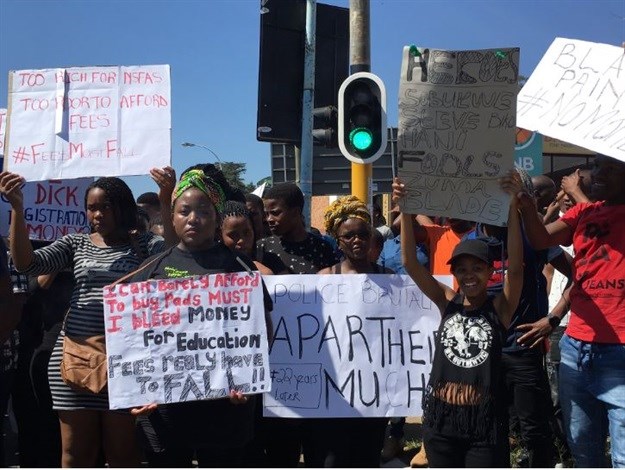
Top stories





Energy & MiningGlencore's Astron Energy gears up with new tanker amidst Sars dispute
Wendell Roelf 16 hours

More news

















Logistics & Transport
Uganda plans new rail link to Tanzania for mineral export boost










Higher education is a resource intensive enterprise. It cannot effectively function without a massive injection of resources in a sustained and escalated way. Professor Bruce Johnstone, a leading US expert in the financing of higher education, has pointed out that:
Higher education cost tends to rise at rates considerably in excess of the corresponding rates of increase of available revenues – especially those revenues that are dependent on taxation.
The recent wave of protests at South Africa’s universities has been driven by students’ unrealistic expectations about “free” higher education. The crisis has been deepened by a web of unsustainable solutions posited by the state and tertiary institutions.
Students would do well to look around their own continent to see how unequal “free” education really is.
Malawi is one of the poorest countries in the world. It offers “free” higher education in the form of a fully funded government scholarship with absurdly nominal fees.
Research conducted at the University of Malawi, the country’s largest and most prestigious institution, found that most students come from upper and upper middle class families. Around 90% of those at the university could easily afford to pay their own way, but instead are receiving government funding.
That funding is drawn from public funds – so the country’s struggling poor and middle class effectively end up bank rolling the education of those who don’t need the support.
Malawi is an extreme example. But it’s typical across Africa – and for that matter the world – that the majority of university students come from well-off families. This is especially true at the continent’s flagship universities and in its most competitive programmes of study. In many countries, their presence is funded by taxpayers’ money. The poor and middle class are paying for the rich to study. How is that “free” or, indeed, fair?
Interestingly, many African countries that have previously claimed to provide “free” higher education have changed their policies in recent years. Enrolments are rising across the continent. Countries have realised that student growth is outstripping what the economic base can generate in tax revenue. Too many students; too few taxpayers.
In Funding Higher Education in sub-Saharan Africa Professor Philip G. Altbach one of the world’s foremost higher education experts, noted that
Without a stable funding base, neither access nor excellence can be achieved. One thing is clear: the common African pattern of full state funding to a small number of universities no longer works – if in fact it ever did.
South Africa is no different from its peers on the continent. Its student population is growing. The cost of running the system is only going to rise, making “free” education even more of a burden.
So what are the alternatives?
The trend in higher education funding is moving towards cost-sharing where students, parents or guardians, governments and other stakeholders collectively contribute. Uganda, for instance, has seen one of the most dramatic changes in higher education funding. In less than a decade its flagship university, Makerere, shifted the landscape to greatly increase the number of fee-paying students.
Other African countries, among them Kenya and Ethiopia, are consolidating cost-sharing through, among other things, setting up student loan systems, though this has been beset with problems. They have realised that they cannot continue to provide “free” education to their citizens – even the needy ones.
South Africa’s “free” education lobby seems to ignore these realities. Protests at universities are becoming increasingly violent with serious destruction of properties. Elsewhere in Africa, governments manage student unrest by shutting universities down indefinitely. In some cases, such as in Nigeria and Kenya, universities have been closed for months at a time.
Can such a situation be avoided in South Africa? Probably not if students continue to harbour such unreasonable expectations.
It is imperative that universities’ resource bases are both diversified and consolidated. Resources from the government need to be augmented with contributions from businesses, development partners, trusts and foundations, parents and students. They must be supplemented through effective use of resources and cutting back on wasteful spending.
The call for free higher education for all in any deeply unequal society is not just meaningless. It is also regressive and self-defeating. Some pundits and even those in the sector seem to believe that free higher education is possible in the long term. In light of a massifying university system, demographic realities and tightening national budgets, they are dead wrong.![]()

The Conversation Africa is an independent source of news and views from the academic and research community. Its aim is to promote better understanding of current affairs and complex issues, and allow for a better quality of public discourse and conversation.
Go to: https://theconversation.com/africa